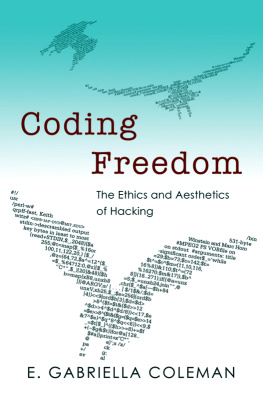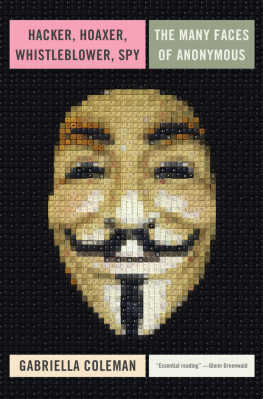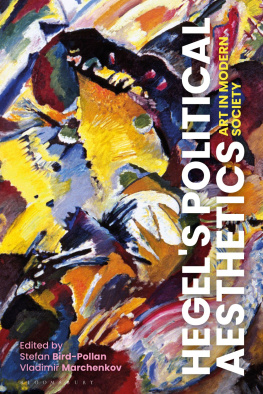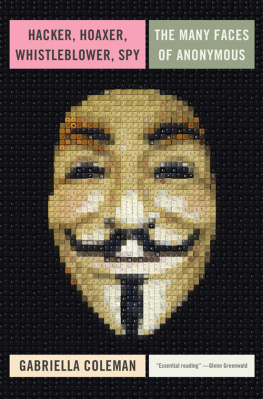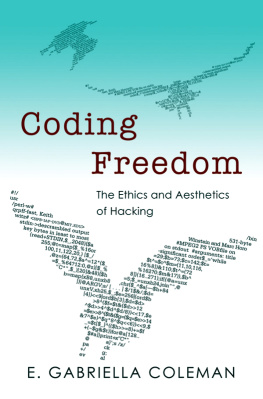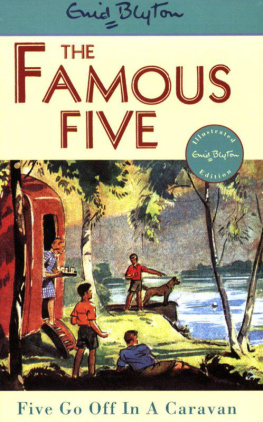Enid Gabriella Coleman - Coding freedom: the ethics and aesthetics of hacking
Here you can read online Enid Gabriella Coleman - Coding freedom: the ethics and aesthetics of hacking full text of the book (entire story) in english for free. Download pdf and epub, get meaning, cover and reviews about this ebook. City: Princeton, year: 2013, publisher: Princeton University Press, genre: Politics. Description of the work, (preface) as well as reviews are available. Best literature library LitArk.com created for fans of good reading and offers a wide selection of genres:
Romance novel
Science fiction
Adventure
Detective
Science
History
Home and family
Prose
Art
Politics
Computer
Non-fiction
Religion
Business
Children
Humor
Choose a favorite category and find really read worthwhile books. Enjoy immersion in the world of imagination, feel the emotions of the characters or learn something new for yourself, make an fascinating discovery.
- Book:Coding freedom: the ethics and aesthetics of hacking
- Author:
- Publisher:Princeton University Press
- Genre:
- Year:2013
- City:Princeton
- Rating:5 / 5
- Favourites:Add to favourites
- Your mark:
- 100
- 1
- 2
- 3
- 4
- 5
Coding freedom: the ethics and aesthetics of hacking: summary, description and annotation
We offer to read an annotation, description, summary or preface (depends on what the author of the book "Coding freedom: the ethics and aesthetics of hacking" wrote himself). If you haven't found the necessary information about the book — write in the comments, we will try to find it.
Coding freedom: the ethics and aesthetics of hacking — read online for free the complete book (whole text) full work
Below is the text of the book, divided by pages. System saving the place of the last page read, allows you to conveniently read the book "Coding freedom: the ethics and aesthetics of hacking" online for free, without having to search again every time where you left off. Put a bookmark, and you can go to the page where you finished reading at any time.
Font size:
Interval:
Bookmark:
Enid Gabriella Coleman

All Your Books Are Belong To Us !
http://c3jemx2ube5v5zpg.onion
The Ethics and Aestetics of Hacking
Copyright 2013 Enid Gabriella Coleman
under Creative Commons Attribution-NonCommercial-NoDerivs CC BY-NC-ND
ISBN 978-0-691-14460-3 (hbk. : alk. Paper), 978-0-691-14461-0 (pbk. : alk. Paper), 978-140-08452931 (e-Book)
Language: English
We must be free not because we claim freedom, but because we practice it.
William Faulkner, On Fear: The South in Labor
Without models, its hard to work; without a context, difficult to evaluate; without peers, nearly impossible to speak.
Joanna Russ, How to Suppress Womans Writing
https://www.gnu.org/copyleft/gpl.html (accessed September 22, 2011).
It is now routine for anthropologists to unpack the effects of liberal formations by attending to the fraught politics of multiculturalism and secularism, the establishment of publics, the coconstruction of markets, marketing, and consumer desire, and the political changes wrought by new national constitutions and neoliberal policies (see Comaroff and Comaroff 2000, 2003; Ferguson and Gupta 2002; Haydn 2003; Mahmood 2004; Ong 2006; Povinelli 2002, 2006; Scott 2011). Despite this rich literature, the influence of liberal values in the context of Anglo-European societies still tends to figure thinly or inconsistently, either as an external economic influence that shapes cultural expressions, or more richly, as relevant to the discussion of secularism, religion, publics, and most especially, multiculturalism. The study of privacy and free speech, for instance, has tended to come in normative, philosophical, and legal terms (Bollinger and Stone 2002; Nissenbaum 2009; Rule 2009; Solove 2010). There is, however, a small but growing body of anthropological literature on liberalism and technology (Helmreich 1998; Malaby 2009) as well as the anthropology of the press and free speech (Boyer 2010; Keane 2009). For an enlivening historical account on liberalism as a lived set of principles in mid-Victorian Britain, see Hadley 2010.
Because the bulk of my research was conducted on Debian, a free software project, and with developers involved with other free software projects, my analysis also tilts in the direction of free over open-source software. And given how much attention has already been placed on open-source over free software, it is key to add this neglected perspective. But much of this book clearly applies to open source, for while even if open-source developers and projects de-emphasize a moral language of freedom (Chopra and Dexter 2007), they still routinely advance liberal ideals in, for example, their commitments to meritocracy and rational, public debate.
I am indebted to the stellar cultural analysis of liberalism offered by Stuart Hall (1986), who makes the compelling case that liberalism is not only a set of political creeds but also exists as cultural common sense composed of a set of interconnected principles that hang together. Halls definition is useful because he highlights some core features (such as a mistrust of authority and an accentuated commitment to individualism), yet he is careful not to pose a single logic to liberalism. He also argues that in its historical and lived dimensions, liberalism has incarnated into what he calls variants of liberalism, replete with differences and contradictions. These differences and contradictions are still part and parcel of liberalisms life, and are evident among hackers.
A less humorous consequence of this ambivalence is the limited funding options available to students and researchers who choose to remain in North America for fieldwork (with the exception of those studying indigenous communities). Not only are existing funds nearly impossible to live on; there are few overall funding sources as well. So even if we have managed to enlarge our field of inquiry, this is a case in which economic constraint works to discourage researchers from walking down a recently opened path.
For thoughtful contemplations on the method of participant observation and fieldwork, see Clifford and Marcus 1986; Comaroff and Comaroff 1992; Faubion and Marcus 2009.
Digital Millennium Copyright Act, 17 U.S.C. 1201(a)(1)(a).
One of the most crystalline examples of this utilitarian justification is provided in Harper and Row, Publishers, Inc. v. Nation Enterprises, a Supreme Court case deliberated in 1985. The question at hand was whether the magazine, the Nation, was entitled under the fair use doctrine to publish a three-hundred-word excerpt, in a thirteen-thousand-word article, from President Gerald R. Fords twenty-thousand-word memoir published by Harper and Row. The court ruled in favor of Harper and Row, upholding the ideal that property rights promote a public benefit by inducing creation. Sandra Day OConnor delivered the majority opinion portraying copyright as the engine of free expression. Versions of this utilitarian rationale, in which Internet protocol (IP) is the basis for harvesting knowledge, continue to be expressed and hold sway within the context of an heightened neoliberal expansion of intellectual property rights, making existing tensions between expressive and IP rights more palpable and acute than ever.
The Silicon Valley geek entrepreneur, who I am not addressing in this book, aligns quite closely with neoliberal aspirations. For a discussion of Web 2.0 technologies, entrepreneurs, and neoliberalism, see Marwick 2010.
http://mbrix.dk/files/quotes.txt (accessed April 10, 2007).
http://www.loyalty.org/~schoen/ (accessed March 19, 2007).
http://www.gnu.org/gnu/manifesto.html (accessed July 30, 2007).
https://upload.wikimedia.org/wikipedia/commons/b/b7/Anti-sec_manifesto.png (accessed, March 26, 2012).
Editorial, The Victor Spoiled, 2600: The Hacker Quarterly 15, no. 4 (199899): 4.
Although my exploration remains hemmed to free software and may not be relevant to all domains of hacking, there is certainly some overlap between what I describe and instances of hacking unrelated to the world of free software.
Gender also receives only cursory attention. The reasons for this omission are multiple, but foremost, I believe far more substantial research on the topic is needed before qualified and fair judgments as to the complicated dynamics at play can be posed, especially since analyses must interrogate wider social dynamics such as education and childhood socialization that have little to do with free software projects. In the last two years, a series of vibrant initiatives around diversity and gender have proliferated in the context of free software, with tremendous support from the wider developer communitysomething I have not been able to research adequately.
While this book attends to a number of translocal aspects of F/OSS development, it by no means captures the reality of all different places where free software has taken hold, such as India, Vietnam, Peru, and Brazil. For instance, many free speech commitments explored in this book are shared by Brazilian developers I worked with, even while the general story of free software in Brazil and other parts of Latin America looks quite distinct from what happened in the United States given how entwined it became with national politics (Chan 2008; Schoonmaker 2009; Murillo 2009).
Font size:
Interval:
Bookmark:
Similar books «Coding freedom: the ethics and aesthetics of hacking»
Look at similar books to Coding freedom: the ethics and aesthetics of hacking. We have selected literature similar in name and meaning in the hope of providing readers with more options to find new, interesting, not yet read works.
Discussion, reviews of the book Coding freedom: the ethics and aesthetics of hacking and just readers' own opinions. Leave your comments, write what you think about the work, its meaning or the main characters. Specify what exactly you liked and what you didn't like, and why you think so.

